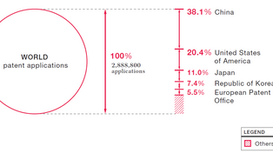Why could a patent be invalidated after it has been granted?
- Admin

- May 10, 2023
- 1 min read

After a patent has been granted, it can still be invalidated or its scope of protection narrowed through a revocation or invalidation process. Due to the high volume of patent applications received by patent examiners, they only have a limited amount of time to review each application. For example, in China, more than three million patent applications were received in 2017. This means that examiners can only spend an average of about two days reviewing each invention, which limits their ability to fully assess the scope of protection. Consequently, if there is any deficiency in the scope of protection designated by the examiner, it is possible for competitors to challenge the validity of the patent.
Although a large number of patents are granted each year, only a small proportion of them have high economic value. It is not cost-effective to spend a lot of time and resources to evaluate each patent application and precisely define the scope of protection. Instead, a preliminary screening process is conducted during the examination process, and after-the-fact re-designation of the boundaries of some high-value patents is allowed through the invalidation procedure.






































Comments